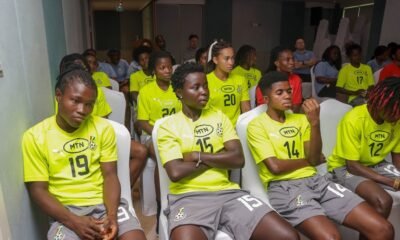News
Communications Minister inspects progress of Girls-in-ICT training in V/R

Mr Samuel Nartey George, the Minister for Communications, Digital Technology and Innovation, has embarked on a working tour of the Volta Region to assess the progress of the ongoing Girls-in-ICT training programme, an initiative aimed at empowering young girls with digital skills.
The Minister’s visit focused on two major training centres currently active in the region — the Amissah-Arthur Learning Centre in Ohawu (Ketu North Municipality) and In My Father’s House RC Basic School in Abor (Keta Municipality) — where hundreds of enthusiastic girls are undergoing practical ICT training.
At the Ohawu Centre, over 60 girls from Ketu North are actively participating in the programme, which is equipping them with coding skills, basic software development knowledge, and digital literacy tools to thrive in today’s technology-driven world.
In his remarks, Mr George reiterated the Ministry’s unwavering commitment to bridging the digital divide and ensuring that girls across Ghana have equal access to technology education.
“This initiative is part of our broader strategy to empower the next generation, especially young girls, to take charge of their futures through ICT. President John Dramani Mahama is committed to seeing every Ghanaian child gain access to digital opportunities, no matter where they live,” he said.
The Minister was accompanied on the tour by Mr Eric Edem Agbana, Member of Parliament for Ketu North; and Mr James Gunu, the Volta Regional Minister.
Mr Agbana advocated further support to enhance ICT infrastructure and expand digital education in rural areas.
Mr Agbana was visibly impressed with the creativity and energy displayed by the girls, who showcased their newly acquired skills through live coding demonstrations and software projects.
The Volta Regional Minister, for his part, expressed his admiration for the programme and the girls’ enthusiasm.
He added: “A lot of girls are ready and willing to learn ICT but previously lacked the means. We are truly grateful to Mr Sam George and his Ministry for making this possible.”
He highlighted that with a national target of training 3,000 girls in 2025, and ambitions to double that number in 2026, the programme is poised to become a transformational force for Ghana’s digital future.
—GNA
News
Man sentenced to 25 years for robbery at Manso Akwasiso

A 30-year-old man has been sentenced to 25 years imprisonment with hard labour by the Bekwai Circuit Court for his role in a 2022 robbery at a mining site at Manso Akwasiso in the Ashanti South Region.
The convict, Dominic Ofori, also known as Fanta, was arrested on 16th February 2026 after years on the run. He pleaded guilty before the Bekwai Circuit Court to robbery contrary to Section 149 of the Criminal Offences Act, 1960 Act 29, and was accordingly sentenced to 25 years imprisonment with hard labour.
On March 20, 2022, the Manso Adubia District Police received intelligence that a group of armed men from Manso Abodom were planning to attack a mining site at Manso Akwasiso to rob the owner of gold concentrate. Acting on the information, police mounted a coordinated operation and laid an ambush at the site.
At about 5:30 pm the same day, four-armed men arrived at the site, fired indiscriminately, and robbed the miners of their gold concentrate. The police team on surveillance intervened, resulting in an exchange of gunfire.
Three of the suspects, Abu Abubakar, Musah Latif, and Gideon Takyi, sustained gunshot wounds and were pronounced dead on arrival at St Martins Catholic Hospital at Agroyesum. Dominic Ofori escaped at the time but was later arrested and put before the court.
The Ashanti South Regional Police Command has assured the public of its continued commitment to combating violent crimes and bringing offenders to justice.
News
Ashanti police arrest man for publishing false news on TikTok

The Ashanti Regional Police Command has arrested 45-year-old Isaac Boafo, also known as “Duabo King,” for allegedly publishing false news intended to cause fear and panic.
Police said the arrest follows a viral TikTok video in which Boafo claimed that four officers at the Central Police Station in Kumasi engaged in inappropriate conduct with commercial sex workers during night patrols in Asafo.
Officers from the Police Intelligence Directorate (Ashanti Region) apprehended Boafo after receiving intelligence about the video.
During questioning, he admitted to creating the video to attract views and engagement online, and acknowledged that he could not prove the allegations.
Boafo also admitted making comments about the President of the Republic for content purposes and could not defend those statements.
He has been formally charged and is in detention as investigations continue.
The Ashanti Regional Police have warned the public against publishing or sharing false information on social media, noting that such acts can cause fear, panic, and damage reputations.
They said anyone found engaging in similar conduct will face legal action.
By: Jacob Aggrey














